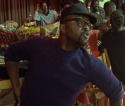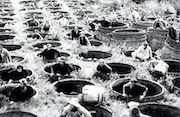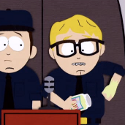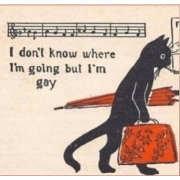|
There are no ships around Earth because it would have been inconvenient to the lovely plot they were trying to hang together, like a myriad of other moments in both movies. Trying to justify it through imaginary fleet operations is kind of hilarious.
|
|
|
|

|
| # ? May 2, 2024 14:56 |
|
AlternateAccount posted:There are no ships around Earth because it would have been inconvenient to the lovely plot they were trying to hang together, like a myriad of other moments in both movies. Trying to justify it through imaginary fleet operations is kind of hilarious.
|
|
|
|
AlternateAccount posted:There are no ships around Earth because it would have been inconvenient to the lovely plot they were trying to hang together, like a myriad of other moments in both movies. Trying to justify it through imaginary fleet operations is kind of hilarious. Stop badmouthing TMP.
|
|
|
|
ApexAftermath posted:I don't understand how so many are hung up on the Enterprise not having backup when "Enterprise is the only ship in the sector" has been accepted without any issue for so long. Tell me about it. I've said this twice and it doesn't seem to ever get through. Do you people not understand how Star Trek works?
|
|
|
|
No Wave posted:Aren't you the one dealing with imaginary fleet operations by assuming that ships "should" be there? We would be, except the first half of the film explicitly establishes multiple ships and a loving big spacestation there. Then Kirk's gone for like half an hour and when he gets back there's nothing around Earth and nobody thinks anything of it. e: ^^ the point is that they don't even bother with the 'we're the only ship in range' courtesy. The film establishes that things exist right up until the point where it forgets about them. This isn't a major issue in itself for me, but it's one of a plethora of lazy weak seams in the plot that reduces this to little more than a mindless action film. And in TUC Enterprise wasn't the only ship in range and it was great
|
|
|
|
ApexAftermath posted:I don't understand how so many are hung up on the Enterprise not having backup when "Enterprise is the only ship in the sector" has been accepted without any issue for so long. Maxwell Lord posted:Tell me about it. I've said this twice and it doesn't seem to ever get through. Do you people not understand how Star Trek works? It's not so much the "only ship in range" thing as the "accepted without issue" thing. If you think anything in Star Trek has ever been accepted without issue, you're the one who doesn't understand how Star Trek works. In earlier eras of Star Trek there was usually some sort of lip service paid to scientific accuracy. There were technical manuals and in the TNG era onwards there was a huge amount of technobabble. I forget exactly how things went in the TOS era but there were certainly big books of actual starship blueprints. This kind of thing actively encouraged viewers to think about the background of the Star Trek universe - it also encouraged nerds to nitpick the little things, especially when mistakes were made or "established facts" were deliberately ignored for the sake of a story. This kind of training is difficult to let go of.
|
|
|
|
The villain controls where the ships go. Unless where the Federation ships are is inconvenient to his plot, it's not a plot hole. And a guy trying to invent a pretext for a war is probably not interested in a passive defense. Keeping ships in orbit doesn't do anything about a terrorist who took a one-way beaming trip to the other side of the galaxy, either. If he can beam back it doesn't help either. To use a real-world analogy because why not at this point, we don't keep carrier battle groups just parked outside New York City indefinitely because terrorism is a thing. poo poo, we didn't do it during World War II when multiple hostile navies were a thing.
|
|
|
|
I don't get a lot of the obsessing about other Starfleet ships here. Admiral Marcus explicitly has control of the fleet and can deploy them as he sees fit. Khan attacks the meeting, taking out who knows how many C/Os and other command figures. Marcus also explicitly tells Kirk (twice) that he's now a fugitive collaborating with the criminal John Harrison. There are three reasons. Two explicitly stated and one inferred. This isn't a plot hole or really even a contrivance. It actually even allows some room for "fanon" speculation which has been the bread and butter of Trek fandom for decades. Similarly, we have a crippled Enterprise just barely able to maneuver. I assumes the reason she suddenly hurtled toward Earth when propulsion failed and out-gassing from the multiple hull breaches sent the ship spiraling out of control. It seems like most people in this thread would rather ignore the discussion of themes, characterization, and cinematography in favor of off-hand nitpicking. Nitpicks are not plot holes and vice versa.
|
|
|
|
yronic heroism posted:Operative word "after." As in after 9/11 and after Khan's first two attacks on Earth. I'm saying that the former was bullshit - there's good reasons why The Pentagon isn't particularly strongly defended to begin with outside of the design of the building itself. This didn't change appreciably after 9/11, even a month after.
|
|
|
|
Great_Gerbil posted:It seems like most people in this thread would rather ignore the discussion of themes, characterization, and cinematography in favor of off-hand nitpicking. Nitpicks are not plot holes and vice versa. Ok fine, lets talk about themes. They're a total mess. Kirk doesn't actually learn the things he says he's learnt at the end of the film, in fact with regards to Pike's assessment of him at the start he takes a crazy suicidal decision at the end and then is saved by blind luck. He hasn't actually learnt anything about pacifism and inner peace, he gets to do the five year mission he wanted at the start of the film and just got interrupted by a crazy guy who wanted to murder him because he's evil. Spock resolves the conflict in the film and a crucial part of his character arc by engaging his inner passion and punching Kirk out. Wait, I mean Khan. I got confused because apparently the only way Spock can achieve character growth now is by getting angry and punching someone. Alchenar fucked around with this message at 15:25 on May 31, 2013 |
|
|
|
Alchenar posted:Ok fine, lets talk about themes. This is some tactical realism stuff that's always bugged me about Star Trek; both Picard and Kirk seem to be the Bruce Lee of their times, which is quite surprising when you consider that we're talking about old men whose main qualification should be command, not Kung Fu, and they're constantly put up against physically superior aliens of all sorts. Picard and Kirk reliably beat up Klingons all the time, baldness/pudge be damned. STID makes a huge point out of Kirk's impotence with this long scene of him pounding on Khan that Khan even reminds him of later in the movie. Instead, Spock has to win the main fistfight for Kirk, while Kirk's main act is physical (reminiscent of climbing the mountain in Generations), but not violent. Kirk's physically weaker than those around him (Sulu knows to fight, too!). Why is he in charge? Because he's good at being in charge. Or at least, he's good at getting in charge by a combination of arrogance, persistence and luck; and somehow, he makes the right decision to save those dependent on him. What has he learned? I don't really know. I'm not sure he has learned anything. But, must he? Must our movies feature a protagonist who learns something?
|
|
|
|
Cingulate posted:What has he learned? I don't really know. I'm not sure he has learned anything. But, must he? Must our movies feature a protagonist who learns something?
|
|
|
|
What do you mean?
|
|
|
|
Basically what Alchenar said.
|
|
|
|
I don't recall Picard being something of the Bruce Lee of his time. He did go John McClane in First Contact but he's usually taken prisoner fairly easily and has to escape or something. And that one time he did that ops mission and got taken prisoner (THERE ARE FOUR LIGHTS). I think the most competent fighter in TNG was pretty much Data. I'm sure besides the emotional outburst there's something that can be said about a vengeance driven Kirk pounding away uselessly against a genetically enhanced super terrorist that probably represents an idea. Until DS9 when Worf, Jadzia, Kira, Odo, and Sisko picked up some steam.
|
|
|
|
Alchenar posted:Ok fine, lets talk about themes. Are you serious? At the beginning of the film he refuses to sacrifice Spock even when it could potentially kill his entire crew. At the end of the film he sacrifices himself to save the entire crew. He went from a guy who is unwilling to make sacrifices and relies on luck to save his rear end to a guy who is willing to make the sacrifice (and okay luck still saves his rear end but he wasn't relying on it).
|
|
|
|
Alchenar posted:in fact with regards to Pike's assessment of him at the start he takes a crazy suicidal decision at the end and then is saved by blind luck Pike told him that his disregard for authority and overconfidence was going to get him and his crew killed. The way things played out made it appear to Kirk that Pike's claim was about to come true at one point (when he apologizes to the crew right before the Vengeance is about to destroy them). This ultimately leads to his 'crazy suicidal decision', which was a choice to sacrifice himself for his crew because he felt responsible for getting them into the entire mess in the first place. The 'blind luck' of his actually surviving in the end actually lets the character learn from the situation rather than just being dead. DFu4ever fucked around with this message at 16:01 on May 31, 2013 |
|
|
|
Guy A. Person posted:Are you serious? I see what they mean. Seeing Kirk's sacrifice as character growth doesn't work for me because I think he would have done the same thing in the same situation at the beginning, too. At the beginning, he wasn't willing to give up his crew, even if it may cost him his career. At the end, he wasn't willing to give up his crew and ship (actually, mostly Spock, even though he didn't knew that Spock was strapped tight while the crew was evacuating at the moment), even if it may cost him his life. I don't see the growth here. Facing fear and showing emotion regarding Spock AND himself while he was fake-dying, that might have been different.
|
|
|
|
The film did one thing right: it really showed Khan's super-enhanced abilities. TWOK simply stated them and didn't really have the SFX to put them on camera.
|
|
|
|
Mister Roboto posted:TWOK simply stated them and didn't really have the SFX to put them on camera. Montalban's chest disagrees.
|
|
|
|
Mister Roboto posted:The film did one thing right: it really showed Khan's super-enhanced abilities. A fistfight isn't the only way to portray superior physique. Cingulate fucked around with this message at 16:21 on May 31, 2013 |
|
|
|

|
|
|
|
Cingulate posted:I see what they mean. Seeing Kirk's sacrifice as character growth doesn't work for me because I think he would have done the same thing in the same situation at the beginning, too. It's not that his willingness to sacrifice himself proves that his character grew throughout the film. Rather he develops by facing that situation. Maybe if he had faced the same challenges at a different time he would have developed the same way, but that's because facing those challenges are what force him to grow as a person. At the beginning he naively brags to Pike about never losing anyone under his command, not realizing that the unearned confidence behind that comment is exactly why Pike doesn't think he's ready. Pike is worried about Kirk in part because he doesn't know how Kirk will handle loss; in the first movie Kirk didn't handle the absence of his father very well, after all. By the end of the film Kirk has faced the possibility of losing everything: his command, his friendships, his crew, his ship, his planet, his confidence in himself (the scene where he admits to Spock he has no idea what to do), his trust in Starfleet, and even his own life. Having faced those challenges and survived he has proven he is now ready for command, and he has earned his five year mission (which is how the film ends). Lord Krangdar fucked around with this message at 16:29 on May 31, 2013 |
|
|
|
I thought Kirk punching Khan over and over was a nice, blunt way of showing the impotence of Kirk's anger.
|
|
|
|
euphronius posted:I thought Kirk punching Khan over and over was a nice, blunt way of showing the impotence of Kirk's anger. That's actually an interesting juxtaposition. Kirk's anger is impotent, Spock's anger is empowering.
|
|
|
|
Khans chest looks a little saggy. Have i been seeing pecks all this time when it really was boobs?
|
|
|
|
Baldrik posted:Khans chest looks a little saggy. Have i been seeing pecks all this time when it really was boobs? I don't think so, everything I've seen/read indicates he was just in really good shape at the time. Pecs can just look kind of booby sometimes?
|
|
|
|
Pretty sure it was just a space man-bra doing the pec work. Sort of how Shatner kept his space-toupee a "secret" all the time.
|
|
|
|
Pycckuu posted:That's actually an interesting juxtaposition. Kirk's anger is impotent, Spock's anger is empowering.
|
|
|
|
DFu4ever posted:Pike told him that his disregard for authority and overconfidence was going to get him and his crew killed. The way things played out made it appear to Kirk that Pike's claim was about to come true at one point (when he apologizes to the crew right before the Vengeance is about to destroy them). This ultimately leads to his 'crazy suicidal decision', which was a choice to sacrifice himself for his crew because he felt responsible for getting them into the entire mess in the first place. Absolutely. Also it mirrored his father's noble sacrifice. I thought that this whole sequence and theme was very well done. In fact, I thought that it was good enough to make the homage to Wrath of Khan still worthy of my attention.
|
|
|
|
Cingulate posted:At the beginning, he wasn't willing to give up his crew, even if it may cost him his career. Kirk never even considers that he may lose his career over saving Spock. He is utterly shocked and flabbergasted when he discovers that Spock didn't cover for him and that he is losing his command. He doesn't think he will have to face the consequences. Later, he willingly faces the consequences. Alchenar posted:He hasn't actually learnt anything about pacifism and inner peace The themes of this film have nothing to do with pacifism and inner peace. You can't fault a film for not adequately addressing topics it never brought up. I've said this before: the film is not taking a stand against violence; it is taking a stand against revenge and militarism.
|
|
|
|
Alchenar posted:Ok fine, lets talk about themes. Why not engage with this as the substance of the theme you are discussing and not as some technical or creative error. Like, I don't really agree with your assessment but Kirk demonstrably not learning what he says he learned or not behaving in reality how he says he behaves is a pretty significant message on it's own regarding Star Trek's whole liberal humanist schtick.
|
|
|
Danger posted:Why not engage with this as the substance of the theme you are discussing and not as some technical or creative error. Like, I don't really agree with your assessment but Kirk demonstrably not learning what he says he learned or not behaving in reality how he says he behaves is a pretty significant message on it's own regarding Star Trek's whole liberal humanist schtick. Because the universe of Star Trek is real (note the references upthread to fleets and space stations and technical manuals) and it's the depiction of the universe thereof that is at fault.
|
|
|
|
|
Lord Krangdar posted:It's not that his willingness to sacrifice himself proves that his character grew throughout the film. Rather he develops by facing that situation. Maybe if he had faced the same challenges at a different time he would have developed the same way, but that's because facing those challenges are what force him to grow as a person. Something the movies make clear is that Kirk isn't too attached to his own life to begin with. The first scene we see him is him literally driving his car over a cliff. He was never afraid of death. (He also losses his "first command" - the car he stole - there.) It's not as if Kirk is simply overconfident because so far, he hasn't had to face loss. He is overconfident BECAUSE he has faced loss (his father). He doesn't care for his own well-being at all, right from the start, nothing changes here. He has always been willing to give everything. Okay, granted, he didn't have to deal with his own death yet, so maybe he learned that. But I don't see how giving all he had (like he always did) without a second thought (as always) for his crew (which we see him do in the first scene, trying to save Spock) is in any way a change. Dealing with death - maybe. But the movie, different from WoK, doesn't start out with the question of how Kirk deals with his own mortality. At the beginning, Kirk is the same as he was at the start. By Khans blood, he is not reborn, he's simply restored. One thing that does happen is this though: Spock "betrays" Kirk, losing Kirk his command; then, Kirk saves Spocks life (everyone was evacuating, only Spock was strapped down!), giving his own; then, Spock saves Kirks life. I'm not actually demanding a character growth arc for Kirk, actually. I don't see why a movie would necessarily need that (and I greatly enjoyed it like this). I'm just saying, the arc you see I don't feel.
|
|
|
|
Cingulate posted:I'm not convinced. How did overconfidence and disregard for authority get Kirk where he had to sacrifice himself? In this movie, he followed orders, he went by the book instead of (trying to) killing Khan out of revenge, and he was betrayed, and that's why the Enterprise is crashing. Kirk wanted to catch Khan so badly he came to Marcus practically pleading to get his command back to chase him down. Marcus instantly saw Kirk as a patsy for his plans because it was obvious that Kirk was pissed and looking for blood. Add to that Kirk's growing reputation as a loose cannon, and Marcus would have been an idiot to not choose him as a pawn. Kirk blindly took on the mission without initially considering what he was being asked to do because he was out for revenge. Ultimately he realizes that his orders are questionable, so he ignores them and captures Khan instead of killing him from a distance. Technically, he was once again disregarding authority by going against his given orders. He did not go "by the book". All of this leads him into a situation where his entire crew is on the verge of being killed because he bullheadedly rushed into action without giving enough thought to the strangeness of the orders he was given and the circumstances surrounding them. EDIT: One thing I thought the movie did well was creating the growing sense of foreboding as all of the different elements of the situation started coming together. DFu4ever fucked around with this message at 21:29 on May 31, 2013 |
|
|
|
Okay that's a valid point. Kirk should have been more sceptical of the order to kill Bin Laden. V Right. But most of the common crew are going for evacuation. If it had worked is another question, but I think it's important that Spock being strapped tight and first was emphasised. Cingulate fucked around with this message at 21:44 on May 31, 2013 |
|
|
|
Cingulate posted:(everyone was evacuating, only Spock was strapped down!), MadScientistWorking fucked around with this message at 21:46 on May 31, 2013 |
|
|
|
MadScientistWorking posted:Didn't watch the movie close enough then. The entire bridge crew technically disobeyed Spock's orders to leave. Don't forget that Kirk saw all the shuttles in the shuttlebay slide out of their berths. He knew many, many members of his crew weren't going to get off the ship.
|
|
|
|
AlternateAccount posted:There are no ships around Earth because it would have been inconvenient to the lovely plot they were trying to hang together, like a myriad of other moments in both movies. Trying to justify it through imaginary fleet operations is kind of hilarious. There was never an Earth defense fleet in the old series either. Every threat to earth was always met with one or two easily destroyed ships or poo poo like the borg episodes where some drones were sent up from mars. In Nemesis they have to cobble together a fleet of about 8 ships. Earth having no standing defenses is not a unique issue to the JJ-verse.
|
|
|
|

|
| # ? May 2, 2024 14:56 |
|
Regarde Aduck posted:There was never an Earth defense fleet in the old series either. Every threat to earth was always met with one or two easily destroyed ships or poo poo like the borg episodes where some drones were sent up from mars. In Nemesis they have to cobble together a fleet of about 8 ships. Earth having no standing defenses is not a unique issue to the JJ-verse. It doesn't even make sense to have a standing force guarding Earth. If you have a force there, you have to have one over Vulcan (and maybe there used to be one), over Betazed, over Andor... Well, you get the picture. Unless you're at war, it's a tremendous waste of resources to have anything more than a few ships at a time just hanging around space dock.
|
|
|

































